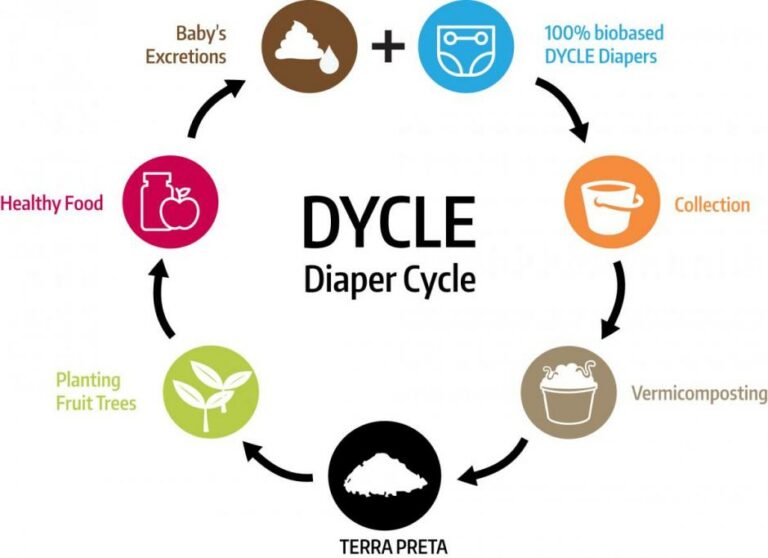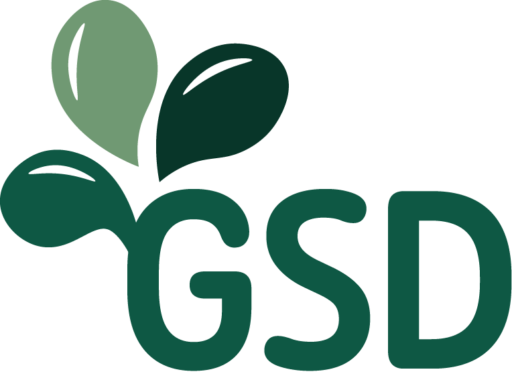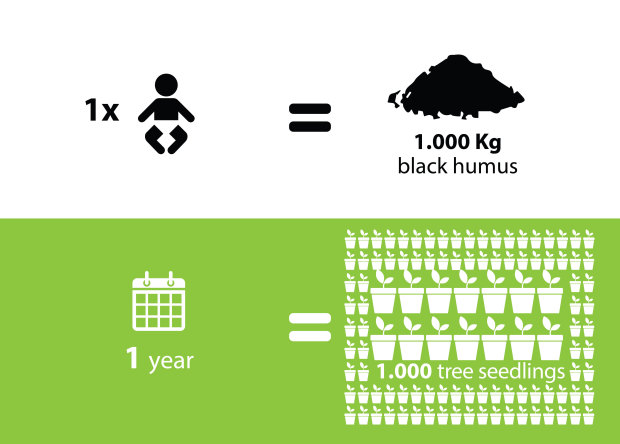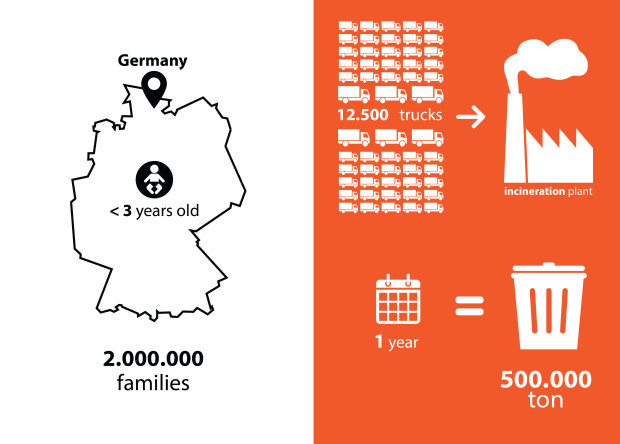Diaper Cycle


One child uses around 5000 diapers until they go to the toilet alone, leaving behind about 500 kg of waste, which is mainly plastic and will be landfilled or burned.
In Germany alone, we estimate 500,000 tons of diaper waste per year (EU: 3,750,000 tons). Valuable nutrients are being wasted, while the topsoil quality is continuously decreasing everywhere in the world, threatening the amount and quality of food that can be produced.
Parents look for healthy and waste-free alternatives, but eco-branded diapers are not compostable, and there is no recycling scheme in place for the nutrients. Many parents have turned to textile diapers, but this means oftentimes extra effort, energy and water for washing – the nutrients are still lost.
DYCLE has developed a system of 100% compostable diaper inlays that can be produced from mostly regional ressources. After use the inlays can be turned into hygienic and fertile soil substrate. Distribution and recollection of materials will be done at meeting places in the neighborhood, thus combining practical and social matters.
The system is strict on quality but flexible on how it might be implemented. Our long term goal is to make the concept available to communities around the world where it is needed.
- More Info
- Gallery
- Video
- Contact
- Challenge Tackled
- Disposable diapers are a known environmental hazard comprising up to 10% of household waste. Each child produces around 500kg of diaper waste in their first two and half years of life that translates into around 1400 litres of crude oil used for plastic components according to DYCLE’s estimations.
The CO2 and methane gas footprints are high. Just the diapers impact is 500kg of CO2 emissions per child, without taking into account transportation, packaging and other.
- Disposable diapers are a known environmental hazard comprising up to 10% of household waste. Each child produces around 500kg of diaper waste in their first two and half years of life that translates into around 1400 litres of crude oil used for plastic components according to DYCLE’s estimations.
- Target group, beneficiaries or clients
- Young families.
- Solution
- DYCLE supports parents who want to take a sustainable approach by using compostable diapers, through a diapers collection system and converting diapers waste into black soil, which will subsequently be used for growing trees and plants locally. As a diaper is full of baby waste, it contains excellent nutrients in a form of phosphates and nitrogen, and it degrades into hygienic and fertile black earth.
- Harvest from the trees could be procured for baby food and juice production, thus closing the nutrients and materials cycle of baby diapers. DYCLE estimates that a 1000kg of black earth can be produced from one year’s supply of diapers from a single child.
- Innovation
- DYCLE is a fundamentally new way of how baby diapers are to be produced, used and recycled, or rather upcycled, when they are no longer a waste but a nutrient for plants, transformed into fertile soil.
- Unique Selling Point
- There is no completely compostable diaper on the market yet.
- Impact
- The project will create small communities of around 100 families each living in the same neighbourhood, meeting regularly at the diapers distribution/collection points, planting fruit trees together, living their lives in a more connected way. We believe that many people’s small change in everyday life can bring bigger changes afoot – strengthening communities from the bottom up.
- Feasibility/Transferability
- DYCLE has already proved feasibility of diapers collection and soil production process with a pilot project in May 2015 with 100% compostable diaper inlays and September 2017 with our DYCLE diaper inlays. Our long term goal is to make the concept available to communities around the world where it is needed.
To Know more:
https://dycle.org/en
https://www.vice.com/en/article/4x5a8w/this-startup-wants-to-turn-diaper-waste-into-fruit-trees
Contact Person:
Christian Schloh, christian@dycle.org


